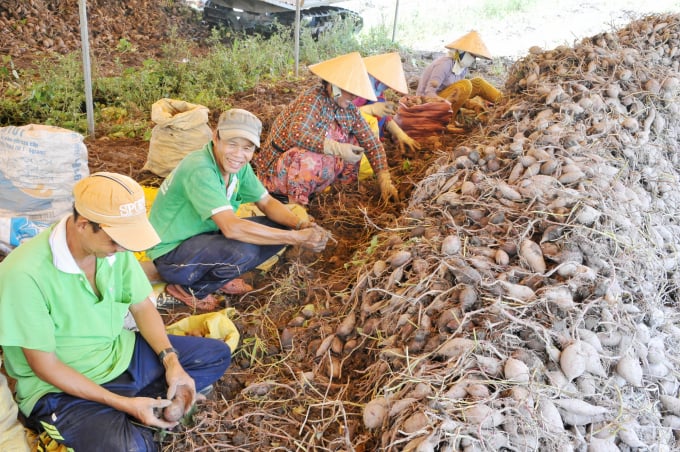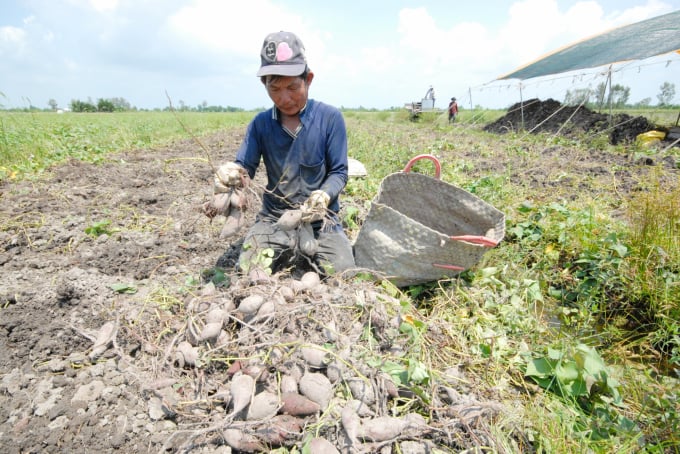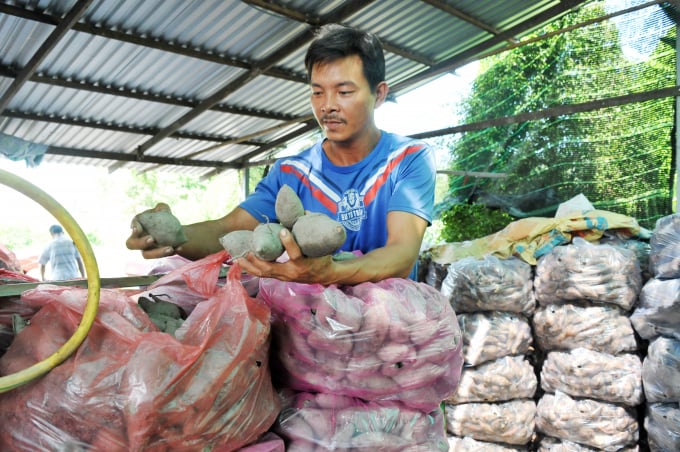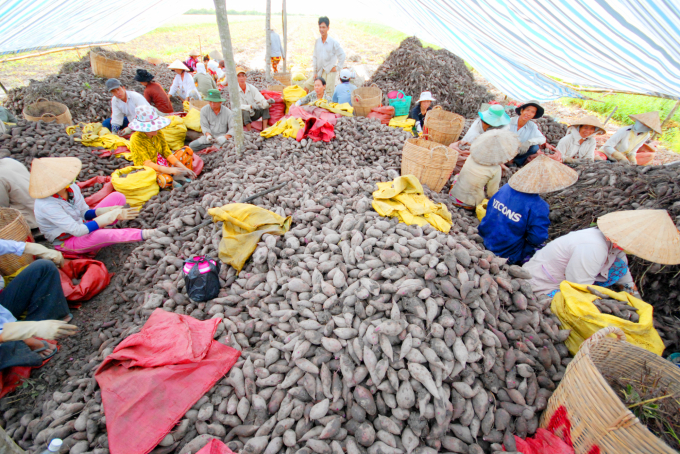May 21, 2025 | 07:11 GMT +7
May 21, 2025 | 07:11 GMT +7
Hotline: 0913.378.918
May 21, 2025 | 07:11 GMT +7
Hotline: 0913.378.918

ChauThanh district is now one of the localities with the largest specialized areasfor exported sweet potatoes in Dong Thap with over 3,300 hectares per year.Photo: Le Hoang Vu.
ChauThanh district is now one of the localities with the largest specialized areas for exported sweet potatoes in Dong Thap with over 3,300 hectares per year. The average yield reaches 25 tons per hectare and output reaches 100,000 tons per year.
Farmers in the communes including Phu Long, Hoa Tan and Tan Phu are focusing on growing sweet potato. Over the past years, growing purple sweet potato helped local farmers improve their income and stabilize their livelihoods. However, in the last two years, the unusual fluctuation of the export market, especially with the negative impacts of the Covid-19 pandemic, farmers in ChauThanh district have faced challenges in finding markets.
Although sweet potato product has benefited farmers with stable economic values the consumption market is still below the inherent potentials. The product is mainly consumed in the domestic market and just exported informally to China and Cambodia.
Meanwhile, sweet potatoes still have enough ability to access the demanding markets such as Japan, South Korea and Australia. However to export the product to the difficult markets it requires to strictly follow the standards of quality, food hygiene and safety.

Previously, farmers benefited good income from cultivating purple sweet potato which has led to mass production of this crop while the consumption market is unstable. Photo: Le Hoang Vu.
In this spring - summer crop season, there are about 266 hectares of sweet potato in ChauThanh district with a total production estimated at 8,500 tons which have not yet been consumed. However, the current challenges are fluctuating market and unstable prices. Therefore, it's necessary to reorganize production in the direction of increasing added values and sustainable development for sweet potato based on renewing production relationships, reducing prices and improving competiveness.
Chairman of ChauThanh District People's Committee, Pham Tan Xieu said that sweet potato is one of the commodities put into the agricultural restructuring scheme. To add value to this commodity, the district has supported farmers to access scientific and technical innovations, conducting many sweet potato cultivation models in the way of reducing price associated with consumption. However, the development of sweet potato farmingin the district has faced difficulties in preservation, processing and consumption.
According to Xieu, in the coming time, to develop sweet potato growing areas in a sustainable way it's crucially important to reinforce the linkages in production and exports among farmers, cooperatives and enterprises in a methodical, rigorous and intensive manner. Currently, ChauThanh district is receiving a great support from Dong Thap province with an investment in agricultural infrastructures for sweet potato growing on an area of 4,000 hectares. The project will be implemented in three phases with a total capital of nearly VND 76 billion.

The development of sweet potato farming in ChauThanh is still facing difficulties due to spontaneous production, lack of close linkages in production.Photo: Le Hoang Vu.
At first, in the first phase (2021-2023), 37 hectares in Hoa Tan commune will be implemented including hardening the embankments to connect traffic between the production areas and RachNha Man and DT 854 Road, facilitating agricultural production and transportation.
Next, implementing investment in information technology application in production such as: smart irrigation system, production management by digital technology, applying mechanization in production and harvest before assessing and expanding production areas.
Currently, due to the impact of the Covid-19 pandemic, the consumption of sweet potatoes has faced many difficulties. This is not only the situation in Dong Thap but also in Vinh Long province which is considered as the sweet potato “capital” of the Mekong Delta.
At present, the selling prices of sweet potatoes can’t make up for the costs of harvesting while traders purchase just a small amount. Farmers conduct production spontaneously, lacking linkages with the market and the product is mainly bought by traders to export informally to China or Cambodia.
Japanese purple sweet potatoes are now sold at VND 5,000 –VND 6,000 per kilogram (a decrease of VND 10,000 per kilogram compared to the end of 2021), growers lost VND 1,000 – VND 2,000 per kilogram. Although it’s the harvesting time of sweet potatoes there is no trader coming to buy their crops.

Due to the impact of the Covid-19 pandemic, sweet potatoes are sold at VND 5,000 – VND 6,000 per kilogram (decreasing VND 10,000 per kilogram compared to the end of 2021), growers lost from VND 1,000 – VND 2,000 per kilogram. Photo: Le Hoang Vu.
To support ChauThanh’s farmers, in recent days many units and organizations such as Dong Thap Specialty Cooperatives, Dong Thap Entrepreneurs club in Ho Chi Minh City, Ho Chi Minh City Youth Union, Dong Thap Trading Group and many supermarkets have been connecting to consume sweet potatoes for farmers. However, the stocks are still huge.
Especially, Dong Thap Specialty Cooperative connected to several individuals and organizations inside and outside the province to consume the product, therefore purple sweet potatoes inChauThanh were consumed timely avoiding loss or damage caused by insects ‘attacks.
Director of Dong Thap Specialty Cooperative Bui ThiThanhThuy said the cooperative’s members were almost working at full capacity to help the consumption of sweet potatoes for ChauThanh’s farmers. Currently, many traders is coming ChauThanh to buy purple sweet potatoes and they are willing to pay few hundred dong higher compared to the prices in the market.
Recently, under the chairmanship of Pham ThienNghia, Chairman of the provincial People’s Committee of Dong Thap, the departments, offices, agencies, organizations, businesses and cooperative have sit down together to solve difficulties for sweet potato growers in the province.
At first, Chairman of the Provincial People’s Committee of Dong Thap Pham ThienNghia asked ChauThanh district to work with agencies, organizations and localities as well as businesses to support farmers to connect and consume their crops. From district to communes and from cooperatives to local farmers, all must join hands and urgently provide enough quantity as ordered.

In the long term, farmers must reorganize production, in which production must be linked with enterprises, improving the quality and expanding cultivation areas meeting the standards of safety for exports. Photo: Le Hoang Vu.
In the long term, Chairman of the Provincial People’s Committee of Dong Thap asked farmers to reorganize production, in which production must be linked with enterprises, improving the quality and expanding cultivation areas meeting the standards of safety, building trademark for ChauThanh sweet potatoes; at the same time, increasing post-harvest processing capacity for cooperatives or businesses.
Dong Thap’s agricultural sector needs to build an agriculture map for farm produce , especially for reconstructed crops and it’s necessary for the map to update production, cultivation areas, harvesting time; thereby it can control and connect for the consumption of farm produce timely as well as giving advices to help farmers make farming more sustainably.
Most recently, the Vietnam Fatherland Front Committee of Dong Thap province has launched the program “Dong Thap’s farm produce – Sharing love” side by side with people in Ho Chi Minh City to overcome the Covid-19 pandemic.
About 20 tons of rice, 5 tons of sweet potatoes, 300 kilograms of dried fishes, 600 bottle of fish sauce and 1,000 eggs will be shipped from Dong Thap to Ho Chi Minh City. The Vietnam Fatherland Front Committee of Dong Thap province mobilized a total amount of more than VND 300 million from organizations, localities and sponsors to support farmers.

(VAN) Khanh Hoa is investing over 545 billion VND to develop 240 hectares of high-tech marine aquaculture in order to guarantee a consistent supply of seafood exports and achieve the USD 1 billion target.

(VAN) Minister of Agriculture and Environment Do Duc Duy held a meeting with Soopakij Chearavanont, Chairman of C.P. Group, on May 15.
/2025/05/16/3800-0-nongnghiep-143756.jpg)
(VAN) Suntory PepsiCo Vietnam coordinated with the Ministry of Education and Training to implement an education program on water conservation, reaching nearly 1 million primary school students nationwide.

(VAN) Vietnam’s TH Group officially put its high-tech fresh milk processing plant into operation in the Russian Federation, marking a historic moment as the first TH true MILK cartons were produced in Russia.

(VAN) Use of high-quality broodstock and biotechnology is regarded as the most effective approach to ensuring sustainable and economically viable shrimp aquaculture ahead of climate change and the emergence of increasingly intricate disease patterns.

(VAN) Carbon farming is a form of agricultural practices that helps absorb more greenhouse gases than it emits, through smart management of soil, crops, and livestock.

(VAN) This is a key content of the Memorandum of Understanding recently signed between the Vietnam Fisheries Society and Kunihiro Inc of Japan.